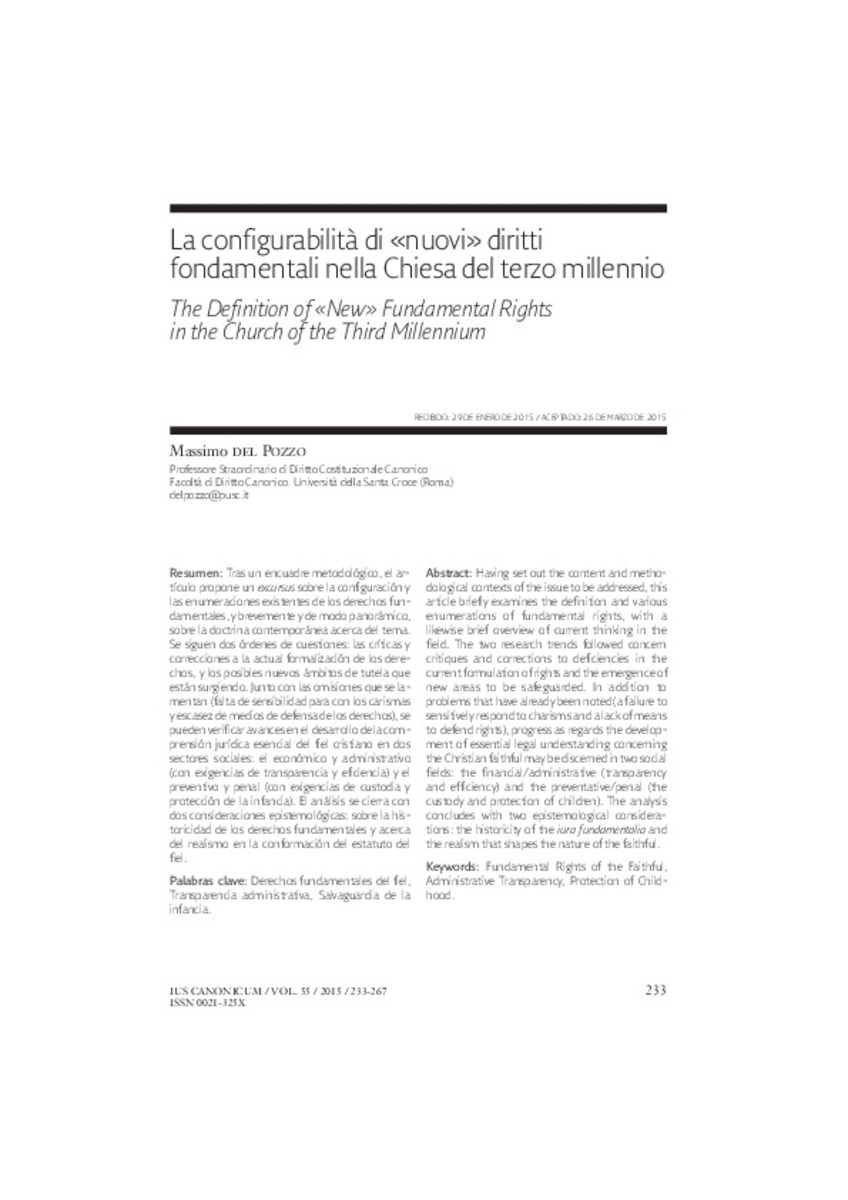Full metadata record
| DC Field | Value | Language |
|---|---|---|
| dc.creator | Del-Pozzo, M. (Massimo) | - |
| dc.date.accessioned | 2017-05-22T14:59:29Z | - |
| dc.date.available | 2017-05-22T14:59:29Z | - |
| dc.date.issued | 2015 | - |
| dc.identifier.citation | DEl-Pozzo, M. (2015). La configurabilità di «nuovi» diritti fondamentali nella Chiesa del terzo millennio. Ius Canonicum, Vol. 55, Nº 109, pp.233-267 | es_ES |
| dc.identifier.issn | 0021-325X | - |
| dc.identifier.uri | https://hdl.handle.net/10171/43335 | - |
| dc.description.abstract | Tras un encuadre metodológico, el artículo propone un excursussobre la configuración y las enumeraciones existentes de los derechos fundamentales, y brevemente y de modo panorámico, sobre la doctrina contemporánea acerca del tema. Se siguen dos órdenes de cuestiones: las críticas y correcciones a la actual formalización de los derechos, y los posibles nuevos ámbitos de tutela que están surgiendo. Junto con las omisiones que se lamentan (falta de sensibilidad para con los carismas y escasez de medios de defensa de los derechos), se pueden verificar avances en el desarrollo de la comprensión jurídica esencial del fiel cristiano en dos sectores sociales: el económico y administrativo (con exigencias de transparencia y eficiencia) y el preventivo y penal (con exigencias de custodia y protección de la infancia). El análisis se cierra con dos consideraciones epistemológicas: sobre la historicidad de los derechos fundamentales y acerca del realismo en la conformación del estatuto del fiel. | es_ES |
| dc.description.abstract | Having set out the content and methodological contexts of the issue to be addressed, this article briefly examines the definition and various enumerations of fundamental rights, with a likewise brief overview of current thinking in the field. The two research trends followed concern critiques and corrections to deficiencies in the current formulation of rights and the emergence of new areas to be safeguarded. In addition to problems that have already been noted (a failure to sensitively respond to charisms and a lack of means to defend rights), progress as regards the development of essential legal understanding concerning the Christian faithful may be discerned in two social fields: the financial/administrative (transparency and efficiency) and the preventative/penal (the custody and protection of children). The analysis concludes with two epistemological considerations: the historicity of the iura fundamentalia and the realism that shapes the nature of the faithful. | es_ES |
| dc.language.iso | spa | es_ES |
| dc.publisher | Servicio de Publicaciones de la Universidad de Navarra | es_ES |
| dc.rights | info:eu-repo/semantics/openAccess | es_ES |
| dc.subject | Derechos Fundamentales del Fiel | es_ES |
| dc.subject | Transparencia Administrada | es_ES |
| dc.subject | Salvaguardia de la infancia | es_ES |
| dc.title | La configurabilità di «nuovi» diritti fondamentali nella Chiesa del terzo millennio | es_ES |
| dc.title.alternative | The Definition of «New» Fundamental Rights in the Church of the Third Millennium | es_ES |
| dc.type | info:eu-repo/semantics/article | es_ES |
| dc.identifier.doi | 10.15581/016.55.692 | es_ES |
Files in This Item:
Statistics and impact
Items in Dadun are protected by copyright, with all rights reserved, unless otherwise indicated.






